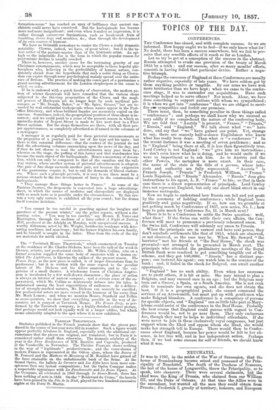CONFERENCES.
THE Conference has closed, and with complete success. So we are informed. How happy ought we to feel—if we only knew what for! No doubt, there has been a success somewhere, but we fail to perceive that any sensible effects of it reach so far as London.
Let us try to get at a conception of the success in the abstract. Russia attempted to evade one provision of the treaty of March 1855 by a trick ; and our success, after so many months' efforts, consists in having foiled that particular device. Rather a negative triumph.
Perhaps the successes of England at these Conferences are usually rather negative, especially of late years. We have seldom got by them anything positive or tangible. By our arms we have won more territories than we have kept; when we came to the conference stage it was to surrender our acquisitions. Have such meetings helped us to serve others? Not much. Alone, we have done something to support nations with whom we sympathized; it is when we get into "conference" that we are obliged to sacrifice oar sympathies and forfeit our promises. There must, then, be something peculiar in these things called " conferences " ; and perhaps we shall know why we succeed so very oddly if we comprehend the nature of the conferring body. We are told that " Austria " is present, "France," "Prussia," " Russia " and "England." We talk about what " we " have done, and say that " we " have gained our point. Yet, strange to say, there are scarcely half-a-dozen Englishmen who know what has really been done. Then what is "a conference"? In the recent instance it was a meeting of seven gentlemen; and as to " England " being there at all, it is less than figuratively true. Lord Cowley is not England: " we " give him no instructions ; we don't even know what he is doing, and he would smile if we were so impertinent as to ask him. As to Austria and the other Powers, the metaphor is more exact. In their case, the name of the state is the title of a person, whose interests and authority are fully represented. " Austria " is Francis Joseph, "Prussia" is Frederick William, " France" Louis Napoleon, and "Russia" Alexander. " Russia" does give instructions to his agent, L. N. " France " to his; • so that in their case there is a direct representation of principals. Lord Cowley does not represent England, but only one short blind street in our immense metropolis. Now we begin to understand how Russia can fail and yet profit by the ceremony of holding conferences ; while England loses positively and gains negatively. If so, how can we grumble at not getting much by Conferences of 1857, new series, No. I.; how hope to gain much by Conference No. II. in March next?
There is to be a Conference to settle the Swiss question: well, what then? If the Swiss can settle their own affairs, the Conference will meet to pronounce a previously rehearsed amen. If the Swiss fail, Conference will solemnly say amen to Prussia.
When the principals are in earnest and have real power, they don't conclude settlements like that of 1815, which are observed, or not observed, as the case may be. When Mr. Seward "the barrister" met his friends at "the Beef House," the check was presented—not arranged to be presented in March next. The principals who attended the preliminary meetings of the Royal British Bank were resolved to get something tangible out of the scheme, and they got 150,000/. "Russia" has a distinct purpose; can instruct his agent; can watch him to the counter of the bank ; and, if foiled in the check for Bolgrad, can await another opportunity. " England " has no such ability. Even when her successes are to profit others, it is hit or miss. She may intend to plan a Belgium, and may succeed once in an age ; but the Belgium may turn out a Greece, a Spain, or a South America. She is not even able to nominate her own agents, and she does not obtain the best. If it is a geographical point, she cannot command the services of an Arrowsmith, but must put up with gentlemen who make Bolgrad blunders. A conference is a conspiracy of persons for specific objects, and " England " can as little take part as Marylebone could assist at the conferences in the Beef House. Probably the best course that England could pursue with regard to Conferences would be, not to go near them. They only embarrass her, though they may be helps to individual attendants. If she were never to join in these exclusively royal congresses, but just support whom she liked and oppose whom she liked, she would make her strength tell in Europe. There would then be Conferences about England, because her power would be felt in her absence, in her free will, and. in her independent action. Perhaps then, if we had some success for self or friends, we should know what it was.




























 Previous page
Previous page